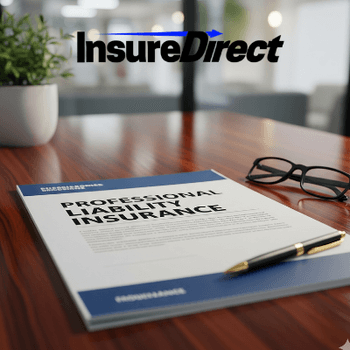I never thought much about lawsuits when I first started working for myself. To me it was like, if I do good work, nothing bad happens. But, nah, real life don’t work that way. A client unhappy? You get blamed, sometimes even when you did everything right. That’s where professional liability insurance comes in—though some people call it E&O (errors and omissions) insurance, which honestly sounds scarier.
What It Actually Is (and Isn’t)
Ok, let me explain it simple. This insurance is basically a shield for people who give advice, do specialized work, or provide services that can go wrong. Not like car insurance or “oops I dropped my phone” kind of thing. More like, “I gave the wrong advice, client lost money, now they wanna sue.”
Unlike general liability, which is more about broken bones, slips, and damaged property, professional liability is all about mistakes in the brain-work you sell. Even tiny mistakes can blow up in court.
Who Really Needs This?
When I first read about it, I thought only doctors and lawyers need it. Big mistake. Way more professions should be looking at it. If you:
Treat patients (nurses, therapists, even pharmacists)
Write contracts or handle cases in law
Help people with money (accountants, advisors, auditors)
Sell homes or do appraisals
Code apps, design websites, or do marketing campaigns
Or even, like me, consult on business strategy
…you’re in the zone. If you do something where your work is based on knowledge and it can go wrong, you’re a candidate. Honestly, if you give advice for money? Get it.
What Does It Cover Anyway?
Here’s where it gets interesting. Insurance like this usually pays for:
Negligence claims – where someone says you made mistakes.
Bad info – you gave wrong advice, caused a loss.
Unfair dealing – you didn’t act in good faith (even if you tried).
Legal costs – lawyers, court, settlements, the whole nightmare.
One time, I read a case about a consultant being sued for $100k just for a plan that didn’t work. The crazy part? The consultant wasn’t even technically wrong. But because the client lost money, they still went after them. Insurance covered defense, which otherwise would have bankrupted them.
What it doesn’t cover: fraud, criminal stuff, employees getting hurt, or property damage. For those, you need different policies (like workers’ comp or general liability).
Why It’s a Big Deal
I know some people think, “I’m careful, I don’t need it.” Yeah, so did I. But here’s the thing: you don’t need to actually do something wrong. Someone only has to believe you did, and suddenly you’re paying attorneys $400 an hour just to defend your reputation. Even if you win, you lose money.
There’s also the trust factor. Clients feel safer when you tell them you’re insured. Some contracts literally require it. It’s almost like showing a driver’s license when you’re behind the wheel—it proves you’re not reckless.
And peace of mind? Honestly priceless. Work feels different when you’re not secretly thinking, “What if this goes south and ruins me?”
The Money Question (How Much It Costs)
Prices? All over the place. Depends on what you do. A solo consultant or small digital marketer might pay just $500–$1,500 a year. Doctors, though? They can be looking at $5,000 or way more. Some lawyers too.
Factors that matter:
How risky your job is.
How much money your business makes.
If you’ve been sued before (insurers really don’t like that).
The coverage limits you pick.
Me personally? I started around the low end. I didn’t need huge limits at first, but I later upgraded when my projects got bigger. Lesson learned: don’t underinsure yourself, but also don’t overpay for coverage you’ll never need.
Choosing a Policy (My Tips)
So many options out there, it’s confusing. What I figured out:
Know your risks. A software dev doesn’t need the same policy as a surgeon.
Look at limits carefully. Small jobs = lower coverage okay. Big projects = more.
Pay attention to claims-made vs occurrence. Claims-made is cheaper but only works if the claim is filed while the policy is active. Occurrence covers even after it ends, if the incident happened while it was active.
Don’t skim the exclusions list. That’s where they hide the “gotchas.”
Talk to a broker who knows your industry. Saved me headaches.
General Liability vs. Professional Liability
At first, I got confused between these two. Quick way to remember:
General liability = physical stuff. Slips, trips, broken laptops, smashed windows.
Professional liability = service stuff. Bad advice, design flaws, messed-up project delivery.
Most smart businesses carry both. Cover all your bases, right?
Wrapping It Up
So yeah, professional liability insurance isn’t optional if you ask me—it’s survival. The world is litigious, people sue first and ask questions later. I’d rather pay a yearly premium than lose everything over a mistake (or even just the perception of one).
It’s not only about money, though that’s huge. It’s also about reputation, contracts, and sleeping better at night. I don’t stress every time I hit “send” on a project anymore. And trust me, that’s worth more than the policy itself.
If you give advice, sell expertise, or deliver any service where a client could say “you messed up,” get this insurance. Don’t wait until after the lawsuit shows up on your desk.
If you’re looking for top-quality insurance coverage, InsureDirect has you covered. Getting a home insurance quote is fast and simple—just visit our website or reach out to our corporate office:
InsureDirect.com
Corporate Home Office: 618 South Broad Street, Lansdale, Pennsylvania 19446
Email: contact@insuredirect.com
Phone: (800) 807-0762 ext. 602
Protect your home and enjoy peace of mind with the reliable insurance solutions from InsureDirect. Your home deserves the very best.

